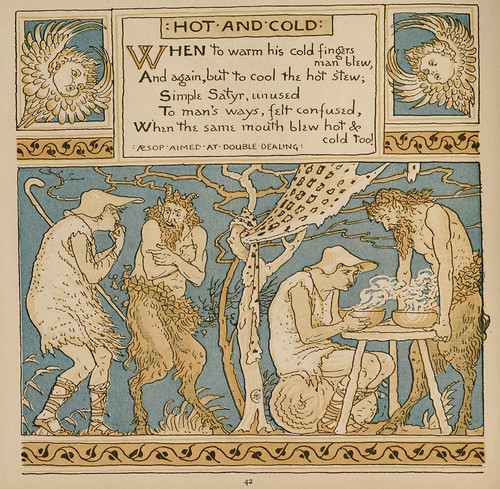HODIE: pridie Kalendas Februarias (and yes, you can have your own Roman Google Calendar).
VERBUM HODIERNUM: Today's word is INTERROGO - read a brief essay about the word at the Verbosum blog. Here's one of the sayings you can find in the essay: Prudens interrogatio quasi dimidium sapientiae, "A skilled inquiry is something like half-way to wisdom" (i.e. asking the right question is half way on the road to getting the right answer).
BESTIARIA PROVERBS: There are some new animal proverbs today for VOLATILES, birds, and VULTUR, the vulture.
PROVERB PODCAST: The latest podcasts are for Homo doctus in se divitias semper habet, "A learned person always has wealth inside himself," and Repetitio mater memoriae, "Repetition is the mother of memory."
FABULAE FACILES: The new easy-to-read fable is Ollae Duae, the story of the two pots, one metal and one clay.
MILLE FABULAE: FABLE OF THE DAY: The fable for today is Herinacei et Viperae , the story of the vipers and their houseguests, the hedgehogs. (You can also a free PDF copy of the Mille Fabulae et Una book.)
MILLE FABULAE: ILLUSTRATIONS: The latest fables with images are Ardea et Accipiter, the story of the heron's shame, and Sus, Porcelli Eius, et Lupus, the story of the sow and how she tricked the wolf, thus saving her little piglets.
ENGLISH AESOP: The latest new fables are The Viper and the File and Demetrius and Menander. (Plus, there's an English "fable of the day" each day, too.)
GOOGLE BOOKS: Today's Google Book is Westcott's Fifty Sories from Aulus Gellius, which contains all sorts of wonderful Latin stories for intermediate Latin students.
TODAY'S MOTTOES & PROVERBS: Widgets available at SchoolhouseWidgets.com.
Tiny Proverbs: Today's tiny proverb is: Beati misericordes (English: Blessed are the merciful).
3-Word Mottoes Verb-less: Today's 3-word verb-less motto is Dominus illuminatio mea (English: The Lord is my shining light).
Latin Animal Proverb: Today's animal proverb is Fugiens ursum, incidi in leonem (English: Fleeing the bear, I ran into the lion).
Proverbs of Polydorus: Today's proverb from Polydorus is: Cui multum datum est, multum quaeretur ab eo (English: Much is expected from him to whom much is given).
Proper Name Proverb from Erasmus: Today's proper name proverb from Erasmus is Amyclas perdidit silentium (English: Silence destroyed Amyclae; from Adagia 1.9.1 - supposedly the people of Amyclae had once been disturbed by false reports of an enemy invasion, so they passed a law forbidding anyone to report an enemy invasion, which meant the town was easily captured when the enemy did arrive).
Greek Proverb of the Day: Today's proverb is Ἑῖς ἀνὴρ οὐ πάνθ' ὁρᾷ (English: One man cannot see all things).
For an image today, here is the coat of arms of Oxford University, with one of today's mottos, Dominus Illuminatio Mea.













